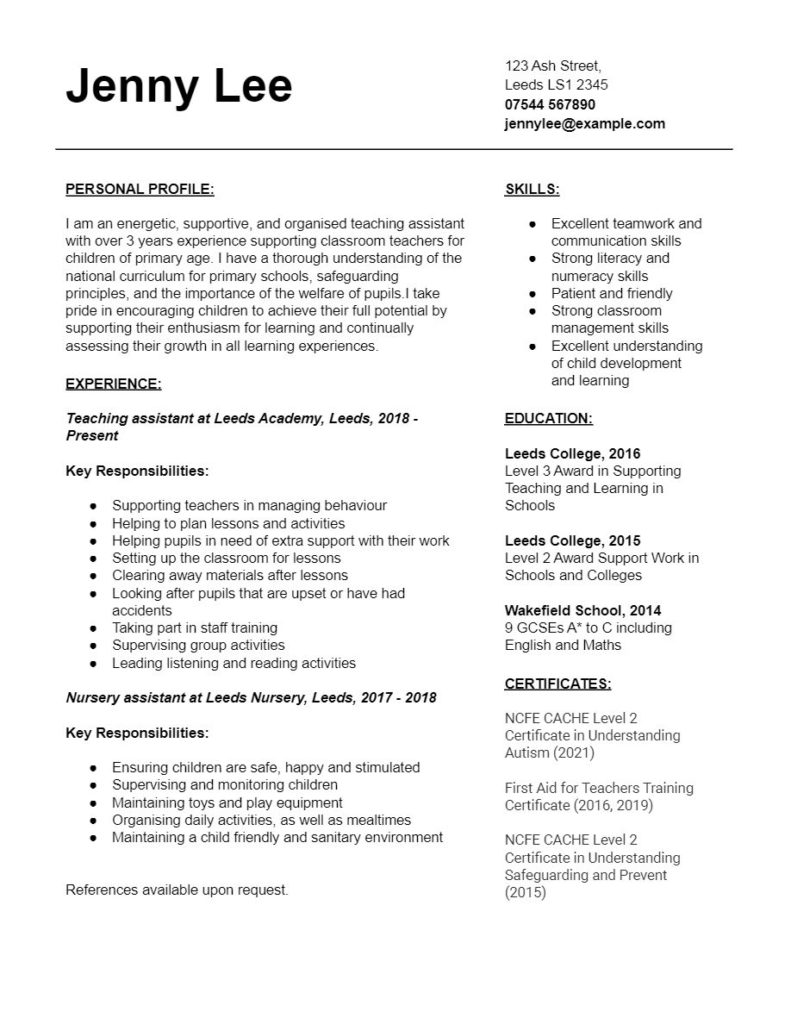
How to Become a SEN Teaching Assistant: Step-by-Step Guide
Becoming a SEN Teaching Assistant is a rewarding career choice. It involves supporting students with special educational needs.
This role is vital in fostering inclusive education and enhancing student learning experiences. SEN Teaching Assistants work directly with students who need extra help. They support their learning and development. This role requires patience, empathy, and dedication. You will assist teachers in creating a supportive learning environment.
You’ll also help students achieve their educational goals. The path to becoming a SEN Teaching Assistant involves specific training and skills. Understanding the needs of students is key. You will learn various strategies to support different learning challenges. This career is fulfilling as you make a real difference in students’ lives. It offers a chance to contribute positively to the education sector.
Role Of A Sen Teaching Assistant
Becoming a SEN Teaching Assistant is a rewarding journey. These professionals play a crucial role in supporting students with Special Educational Needs. They ensure that each child receives the attention and support they need to thrive in an inclusive education environment. The role of a SEN Teaching Assistant is vital. It bridges the gap between students and the curriculum, making learning accessible to all.
Daily Responsibilities
A SEN Teaching Assistant’s day is dynamic and varied. They engage in multiple tasks to facilitate effective learning:
- Classroom Support: Assist teachers in preparing learning materials. Help maintain a conducive environment for learning.
- Student Engagement: Motivate students to participate in classroom activities. Encourage interaction with peers.
- Behavior Management: Implement strategies to manage classroom behavior. Ensure a peaceful and productive learning space.
Here is a typical schedule:
| Time | Activity |
|---|---|
| 8:30 AM | Prepare classroom materials |
| 9:00 AM | Assist in lesson delivery |
| 11:00 AM | Support individual student needs |
| 1:00 PM | Facilitate group activities |
| 3:00 PM | Review and feedback |
Skills Required
To excel as a SEN Teaching Assistant, certain skills are essential. They ensure effective support for students:
- Communication Skills: Convey information clearly. Listen actively to understand student needs.
- Empathy In Teaching: Show understanding and patience. Recognize the unique challenges faced by each student.
- Educational Qualifications: Basic qualifications in education are often required. Ongoing professional development is encouraged.
Additional skills include:
- Adaptability to different learning environments.
- Problem-solving capabilities.
- Commitment to inclusive education practices.

Educational Qualifications
To become a SEN (Special Educational Needs) Teaching Assistant, understanding the educational qualifications is crucial. These qualifications ensure you are well-prepared to support students with diverse learning needs. As a SEN Teaching Assistant, you will work closely with teachers to create an inclusive learning environment. This involves understanding various educational and developmental strategies. Below, we explore the necessary certifications and relevant courses that can enhance your skills and knowledge in this rewarding field.
Necessary Certifications
Certifications play a vital role in becoming a competent SEN Teaching Assistant. They demonstrate your commitment and capability to handle the responsibilities effectively. Here are some essential certifications you might consider:
- Special Educational Needs Training: This certification provides foundational knowledge about various learning disabilities and how to support them.
- Safeguarding Children Training: Understanding child protection is crucial. This certification ensures you can recognize and respond to any safeguarding concerns.
- Inclusive Education Practices: Learn how to create a learning environment that embraces diversity and inclusion.
These certifications not only enhance your resume but also equip you with practical skills. They prepare you for the challenges you might face in a classroom setting. Below is a table summarizing key certifications:
| Certification | Description |
|---|---|
| Special Educational Needs Training | Focuses on understanding and supporting diverse learning needs. |
| Safeguarding Children Training | Ensures awareness of child protection issues. |
| Inclusive Education Practices | Teaches strategies for creating inclusive classrooms. |
Relevant Courses
Courses that focus on child development and psychology are highly beneficial for aspiring SEN Teaching Assistants. These courses provide insights into the learning processes and behavioral strategies.
- Child Development Courses: Understand the stages of child development. Learn how these stages impact learning and behavior.
- Behavior Management Strategies: Acquire skills to manage and guide student behavior effectively.
- Educational Psychology: Gain insights into how students learn and how to support them.
Enrolling in these courses can significantly enhance your teaching assistant skills. You’ll be better equipped to provide classroom support techniques that cater to individual needs. Here’s a quick look at some relevant courses:
| Course | Focus Area |
|---|---|
| Child Development Courses | Growth stages and learning impacts |
| Behavior Management Strategies | Managing and guiding behavior |
| Educational Psychology | Learning processes and support |
These courses and certifications form the backbone of SEN Teaching Assistant qualifications. They provide the knowledge and skills necessary to support for learning in an inclusive and effective manner.
Gaining Experience
Becoming a SEN (Special Educational Needs) Teaching Assistant requires dedication and a passion for inclusive education. A significant step towards this career is gaining experience. By immersing yourself in real-world settings, you can develop crucial skills and understand diverse learning needs. Building experience helps in honing your Teaching Assistant Skills, such as Classroom Management Techniques and understanding Educational Psychology. Let’s explore the paths to gaining experience.
Volunteering Opportunities
Volunteering in Education offers a fantastic way to gain hands-on experience. Many schools and organizations seek volunteers to support students with special needs. This experience can be invaluable for those pursuing a Career In Special Education.
- Develop Practical Skills: Engage directly with students, applying Inclusive Education Strategies and Special Educational Needs Support.
- Build Professional Networks: Connect with educators and professionals in the field.
- Enhance Your Resume: Volunteering shows dedication and initiative, valuable traits for any role.
Consider participating in local community programs or contacting schools directly. Opportunities vary, so research and reach out to find a fit that aligns with your interests. Schools often value enthusiastic volunteers eager to make a difference. Here’s a simple table to guide you on where to find volunteering opportunities:
| Organization | Contact Method | Types of Roles |
|---|---|---|
| Local Schools | Email or Visit | Classroom Support, Event Assistance |
| Community Centers | Phone or Online Form | Workshops, After-school Programs |
| Non-Profit Organizations | Website Application | Tutoring, Special Events |
Internships
Internships for Teaching Assistants provide structured learning environments. These opportunities are crucial for gaining real-world experience and understanding the intricacies of SEN Teaching Assistant Qualifications. Internships often offer:
- Guided Learning: Work under experienced educators who can mentor and guide you.
- Exposure to Professional Settings: Learn about classroom dynamics and apply Classroom Management Techniques effectively.
- Skill Development: Enhance your Teaching Assistant Skills through practical application and feedback.
To secure an internship, consider enrolling in Teaching Assistant Training Programs that offer placement services. These programs can connect you with schools or special education centers that provide hands-on experience. Here’s a brief list of potential sources for internship opportunities:
- Educational Institutions with specialized departments
- Non-Profit Organizations focused on special education
- Online platforms offering internship placements
Internships are not just about gaining experience; they’re about immersing yourself in the field. This experience is invaluable for aspiring teaching assistants aiming to make a meaningful impact in special education.

Building Essential Skills
Becoming a Special Educational Needs (SEN) Teaching Assistant is a rewarding journey. It involves nurturing children with diverse needs and providing them with the support they deserve. Building essential skills is crucial for success in this field. These skills help in understanding and assisting children effectively. From mastering communication strategies to implementing behavior management techniques, every skill contributes to a better learning environment. Let’s dive into some of these vital skills that can make a significant difference.
Communication Techniques
Communication is key in providing effective support to children with Special Educational Needs. As a Teaching Assistant, it’s essential to develop strong communication strategies. These strategies help in conveying information clearly and understanding students’ needs.
- Active Listening: Pay attention to what the child is saying. Respond appropriately to show you understand their concerns.
- Non-verbal Communication: Use gestures, facial expressions, and body language to communicate with students who may struggle with verbal communication.
- Simple Language: Use clear and simple words. This helps children understand instructions and feedback easily.
Building relationships with students is essential. Trust and understanding are the foundation of effective communication. Involve parents and other educators in developing communication strategies. This collaboration supports individualized education plans and enhances inclusive education.
| Technique | Benefit |
|---|---|
| Active Listening | Improves understanding |
| Non-verbal Communication | Facilitates interaction with non-verbal students |
| Simple Language | Ensures clarity |
Behavior Management
Behavior management is another critical skill for SEN Teaching Assistants. It involves understanding child development and implementing support strategies to manage classroom behavior effectively.
- Positive Reinforcement: Encourage good behavior by rewarding students. This helps in motivating them to repeat positive actions.
- Consistency: Maintain consistent rules and consequences. This creates a predictable environment that children can rely on.
- Emotional Support: Offer emotional support to students. Understand their feelings and provide guidance to manage their emotions.
Effective behavior management ensures a harmonious classroom environment. It’s important to tailor strategies to meet individual needs. Collaborate with teachers to create individualized education plans. This collaboration enhances professional development and classroom management. By understanding and implementing these strategies, SEN Teaching Assistants can significantly contribute to inclusive education.
Navigating Job Applications
Becoming a SEN Teaching Assistant is a rewarding career path. It involves providing support to students with Special Educational Needs. Navigating job applications is a crucial step in this journey. Crafting a strong application can set you apart from other candidates. Your resume and cover letter are the first impressions potential employers get. They showcase your qualifications and passion for the role. Let’s dive into how to make your application shine.
Resume Tips
Creating a standout resume is essential. Highlighting Teaching Assistant Qualifications and relevant experiences is key. Use clear, concise language. Ensure your resume is easy to read. Consider the following tips:
- Professional Experience: Focus on roles that involve Educational Support Roles or Inclusive Teaching Strategies. Mention specific tasks, like assisting with Behavior Management Techniques or implementing Classroom Management plans.
- Education: List any degrees or certifications related to Child Development Knowledge or Special Educational Needs.
- Skills: Highlight Sen Teaching Assistant Skills, such as Empathy In Education and Professional Development In Education.
- Format: Use bullet points for easy reading. Keep sections clearly defined.
| Section | Details |
|---|---|
| Contact Information | Include name, phone number, and email address at the top. |
| Objective | Write a short statement about your career goals and passion for education. |
Cover Letter Essentials
Your cover letter should complement your resume. It provides a deeper insight into your motivations and experiences. Here’s what to include:
- Introduction: Start with a strong opening. Mention the position you are applying for and where you found the job listing.
- Experience: Share specific examples of your work in Educational Support Roles. Detail how you have used Inclusive Teaching Strategies and Behavior Management Techniques in past roles.
- Skills: Discuss your Sen Teaching Assistant Skills. Emphasize your Empathy In Education and ability to adapt to diverse learning needs.
- Closing: Thank the reader for considering your application. Express enthusiasm for the opportunity to contribute to their team.
Keep your cover letter concise. Use clear, simple language. This ensures your message is easily understood. Tailor each letter to the specific job. Reflect on how your skills align with the school’s needs.
Interview Preparation
Preparing for an interview as a SEN Teaching Assistant is crucial. It gives you the chance to showcase your skills and qualifications. Interview preparation involves understanding the role and the skills required. You’ll need to know about Inclusive Education Practices and Support Strategies For SEN Students. Communication Skills For Educators are vital too. This preparation helps you present yourself as the ideal candidate.
Common Questions
During the interview, you may face questions that test your understanding of Child Development Principles and Classroom Management Skills. Knowing these can give you an edge. Here are some common questions:
- How do you apply Inclusive Education Practices in a classroom?
- Describe your experience with Behavior Management Techniques.
- How do you support students with Special Educational Needs?
- What are your strategies for effective Communication Skills For Educators?
Consider this table for detailed answers:
| Question | Suggested Answer |
|---|---|
| Inclusive Education Practices | Include diverse materials and adapt lessons to meet all students’ needs. |
| Behavior Management Techniques | Use positive reinforcement and clear rules to guide student behavior. |
| Special Educational Needs Support | Provide personalized learning plans and regular check-ins. |
| Communication Skills For Educators | Engage with students actively and listen to their concerns. |
Dress And Presentation
Your attire and presentation speak volumes during an interview. Dressing smartly reflects professionalism and respect. A Teaching Assistant Training Course might have taught you this. Follow these simple guidelines:
- Wear clean, well-fitting clothes that suit a school environment.
- Avoid flashy accessories; they can be distracting.
- Choose neutral colors, which are generally safe and professional.
Presentation is more than clothes. Educational Psychology suggests that body language impacts perception. Stand tall, maintain eye contact, and smile warmly. These actions convey confidence and approachability. A confident presentation can enhance your qualifications, like SEN Teaching Assistant Qualifications, making you stand out.
Continuing Professional Development
Continuing professional development is vital for anyone aiming to become a SEN Teaching Assistant. Constant growth helps in understanding the evolving needs of special education. It equips individuals with necessary tools and knowledge to support students effectively. Those pursuing this path should focus on enhancing skills and gaining deeper insights into special educational needs.
Workshops And Training
Engaging in Educational Workshops for SEN is essential. These workshops provide practical learning experiences. They cover a range of topics such as Classroom Support Techniques and Inclusive Education Strategies. Here are some benefits of attending workshops:
- Hands-on experience with new teaching methods.
- Access to expert advice and guidance.
- Opportunities to test new Sen Teaching Resources.
Training sessions often include interactive activities. Participants work on real-life scenarios. This type of learning fosters better understanding and application of Special Needs Assistant Skills. Consider this table for types of training sessions available:
| Type of Training | Focus Area |
|---|---|
| Online Courses | Special Educational Needs Training |
| In-Person Workshops | Practical Classroom Support Techniques |
Staying updated with training helps in gaining Sen Teaching Assistant Qualifications. It prepares individuals for diverse challenges in the classroom.
Networking Opportunities
Building connections through Networking In Education is crucial. Networking provides access to a wealth of resources and support. It helps SEN Teaching Assistants to share experiences and strategies. Effective networking includes:
- Joining professional groups and forums.
- Participating in conferences and seminars.
- Engaging with peers online.
These activities promote collaboration. They offer a platform to discuss Inclusive Education Strategies and explore new ideas. Networking also aids in understanding diverse needs. It enriches knowledge about Working With Children With Disabilities. Collaborating with others leads to improved Professional Development For Teaching Assistants. Regular interaction with fellow educators enhances learning. It provides insights into best practices and innovative solutions. Networking opportunities are invaluable for personal and professional growth.

Challenges And Rewards
Becoming a SEN Teaching Assistant is a journey filled with both challenges and rewards. Working in special needs education requires unique skills and a compassionate heart. The path involves mastering inclusive education practices and providing emotional support in education. While the challenges can be significant, the rewards are profound. Understanding the balance between these challenges and rewards helps in making a meaningful impact on students’ lives.
Handling Difficult Situations
SEN Teaching Assistants often face difficult situations that test their skills and patience. Effective classroom management skills are crucial when dealing with diverse learning needs. Special needs education training equips you with the necessary tools to handle these challenges. Behavior management strategies are essential in maintaining a positive learning environment. Understanding each student’s unique needs helps in creating tailored strategies. Here are some common challenges and ways to address them:
- Managing disruptive behavior with calmness and consistency.
- Adapting lesson plans to suit individual learning styles.
- Collaborating with teachers for effective teamwork in educational settings.
Communication techniques for SEN students play a vital role. Clear and simple instructions can prevent misunderstandings and frustration. A SEN Teaching Assistant must also be adept in special educational needs support. A table outlining some key skills and their applications can be helpful:
| Skill | Application |
|---|---|
| Inclusive Education Practices | Designing accessible lesson plans |
| Emotional Support In Education | Building trust and rapport with students |
| Classroom Management Skills | Maintaining a structured learning environment |
Celebrating Successes
The rewards of being a SEN Teaching Assistant are deeply fulfilling. Celebrating successes, no matter how small, is a key part of the role. Witnessing a student’s progress is a significant achievement. Professional development for teaching assistants often includes recognizing milestones and fostering growth. Here are ways to celebrate successes:
- Recognize and praise individual achievements.
- Document progress to share with parents and colleagues.
- Encourage students to set and achieve personal goals.
Teamwork in educational settings enhances these celebrations. Sharing achievements with the school community boosts morale and motivation. Acknowledging both small and large accomplishments keeps the learning environment positive. Special educational needs support extends beyond academics. Emotional support in education is crucial. Celebrating successes fosters confidence and resilience in students. This positive reinforcement encourages continued growth and development.
Frequently Asked Questions
What Skills Do You Need To Be A Sen Teaching Assistant?
A SEN teaching assistant needs strong communication skills, patience, empathy, and adaptability. Understanding special educational needs is essential. Teamwork and organizational skills help in supporting students effectively.
How Much Does Sen Make?
Sen’s earnings can vary widely depending on factors like job type, location, and experience. On average, a senator in the United States earns around $174,000 annually. For other roles or countries, salaries differ significantly. Always check specific sources for accurate and up-to-date information regarding individual earnings.
What Is The Difference Between A Teaching Assistant And A Sen Teaching Assistant?
A teaching assistant supports classroom activities and student learning. A SEN teaching assistant specializes in assisting students with special educational needs, providing tailored support to enhance their educational experience. Both roles involve collaborating with teachers, but SEN assistants focus more on individualized strategies to aid students with learning difficulties.
What Qualifications Do You Need To Be A Teaching Assistant?
Teaching assistants typically need a high school diploma or equivalent. Some roles require a college degree or relevant certifications. Experience working with children is often preferred. Strong communication and organizational skills are essential. Specific qualifications may vary by school or district requirements.
Conclusion
Becoming a SEN Teaching Assistant is a rewarding path. It allows you to support and inspire students with special needs. Start by gaining relevant qualifications and experience. Volunteer in schools to build confidence. Develop strong communication skills for better interaction.
Stay patient and compassionate with students. Learn to adapt to different learning styles. Always seek opportunities for professional growth. Keep improving your skills and knowledge. Your efforts can make a real difference. Empower students, and help them thrive. Embrace this role with dedication and passion.
Your journey as a SEN Teaching Assistant is impactful.





